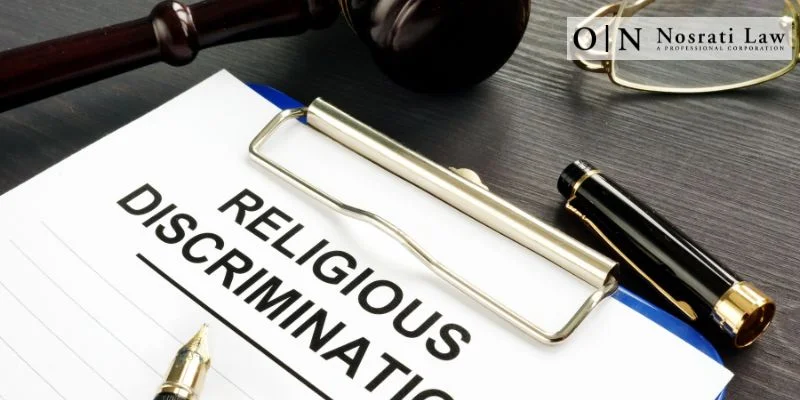
FREE CONSULT
ALL FIELDS REQUIRED*
NO RECOVERY NO FEE
Religious freedom is one of the cornerstones of life in the United States. Your religious beliefs are your right. In California, no one can take away your religious beliefs or tell you to change them. It is also against the law to discriminate against you because of your religion, ethics, or moral beliefs. If your employer, coworkers, or other parties treat you differently or unfavorably because of your religion or because you are married to someone of a certain religion, you are the victim of discrimination.

Religious freedom is a term used to describe the right that humans have to practice the religion of their choice. It is such an integral part of the country’s legislation that it was adopted as the first amendment to the United States Constitution in 1791 as part of the Bill of Rights. The specific vocabulary utilized in the first amendment is: “Congress shall make no law respecting an establishment of religion, or prohibiting the free exercise thereof; or abridging the freedom of speech, or of the press; or the right of the people peaceably to assemble, and to petition the Government for a redress of grievances.” Going forward, this has served as a guide to enact further laws and regulations supporting people’s rights to follow their preferred religion and protecting them from discrimination from other parties.
Religious discrimination refers broadly to any instance during which a person is treated differently due to their religion or is prohibited from doing something that is deemed a necessary part of their religious practice. This is particularly true in the workplace. Unfortunately, there are all sorts of individuals who use someone’s religion as a way of justifying inappropriate behavior. This sort of thinking is entirely discriminatory and does not belong in a professional work environment. While at the workplace, employees have the right to practice their religion without any negative repercussions, such as harassment or abuse, from their employers.
Another form of religious discrimination that is not discussed often involves openly giving members of certain religions advantages over their peers. For instance, if the only staff members who are awarded promotions are those who attend a specific church or participate in certain religious activities, it would be discriminatory against people of other religions, and would fall under the category of religious discrimination.
Religious discrimination can be direct or indirect. Direct discrimination is when someone specifically targets you based on your religion. This is the kind of discrimination that most people envision when discussing the subject. However, there are indirect, more insidious forms of discrimination as well. Employers might design the work schedule so that it does not allow their employees to participate in religious holidays or word their dress code in a strict manner that does not permit the use of religious attire, such as hijabs or yarmulkes. This kind of behavior can be more challenging to address because it is far more discreet, but that doesn’t make it any more acceptable or legal than other forms of discrimination.
As discussed above, religious discrimination can appear in a variety of different circumstances. In some cases, it can be difficult to determine whether something can truly be classified as an act of discrimination out of a desire to minimize the issue. Bringing up concerns about discrimination in the workplace can be intimidating, and employees who find themselves targeted might be afraid of not being taken seriously or even facing retaliation. That’s why it can be helpful to look over specific examples of religious discrimination. If you have experienced any of the following, you have likely experienced religious discrimination:

While individual companies may have their own policies against discrimination, the right to religion is also supported by law. One of the most relevant pieces of legislation in this regard is Title VII of the Civil Rights Act of 1964. The act protects employees from religious discrimination in two ways. First, it stipulates that religion cannot impact how an employee is treated, which applies to firing, hiring, and other workplace-related events. Second, it states that employers are expected to make reasonable accommodations for religious needs, including religious attire, religious holidays or segments of time, dietary restrictions, and more. Employees also cannot be harassed or subjected to a hostile work environment due to their religion.
Suppose there is a strong system of support against such discrimination in your workplace. In that case, you might be able to resolve the issue by meeting with your human resources representative or discussing the situation with your supervisor. However, in some cases, such individuals might be complicit in the discrimination, making you feel like you have no options at your disposal. The fact of the matter is that regardless of how responsive your work environment might be, you are still entitled to your religious rights.
If you cannot pursue any internal options, the next step is to reach out to an experienced Los Angeles religion discrimination attorney. The team at the Law Office of Omid Nosrati has extensive experience working with all sorts of different religious discrimination cases. With our support, you can ensure that your rights in the workplace are upheld and that you remain free to practice your religion without fear of negative repercussions.
In Los Angeles, California, the religious rights of employees are protected by the Title VII of the Civil Rights Act and the Fair Employment and Housing Act, and these rights can indeed be defended in court. That being said, it’s essential to proceed in the right manner to ensure that your case won’t be disregarded or tossed out for irrelevant reasons. For starters, when filing a claim, you need to determine what kind of claim you are filing and obtain the appropriate right-to-sue letter before proceeding, something that the courts will require. In California, such a letter can be issued by the California Department of Fair Employment and Housing (DFEH) or the federal Equal Employment Opportunity Commission (EEOC).
Your discrimination lawyer can guide you through the process, starting with verifying the details of your case and ensuring that you have sufficient evidence documenting the discriminatory behavior before moving on to the next step. When you re-read, they can see that you go through the right channels to obtain your right-to-sue letter.
To have a successful outcome in court, it is often necessary to have some evidence to back up your claims. Since the members of the court were not present when the incident took place, they rely upon that evidence to draw conclusions and make their final decision. Unfortunately, employers are not likely to openly document their discriminatory behavior, making it difficult to compile the evidence necessary to proceed. While it would be convenient to stumble upon something as explicit as a memo from your boss stating that they refused to give you a promotion because they don’t trust members of your religion, it is rarely that simple.
A good discrimination lawyer can instead compile various other pieces of evidence that, when brought together, paint a pretty clear picture. For instance, if scheduling records show that you made a request for time off based on religion and were denied because of a cited staff shortage, but your coworkers had their time off approved without issue, it would reveal a targeted inconsistency. Records can also reveal a pattern of discriminatory behavior over time. Your employer might be able to explain away an isolated incident, but a pattern of behavior is much more difficult to excuse.

Generally speaking, the laws are pretty clear regarding the illegality of blatant harassment and mistreatment of employees based on religion. However, things can be a little more complex when the subject of accommodations is brought up. According to current labor laws, employers are required to provide reasonable religious accommodations for their employees, the keyword being “reasonable.” That doesn’t mean that every religious request must be approved.
In terms of accommodations, those that are reasonable are considered to be those that would not cause undue hardship to the employer. Factors that could cause an accommodation to be classified in this manner include a significant increase in expenses, a hazard to workplace safety, a noticeable impact on productivity, and a violation of the rights of other employees.
The other limitation is regarding what might be considered a defensible religion in the first place. You do not have to belong to a giant church to have religious rights; however, there are specific stipulations regarding what types of beliefs can or can’t be protected. To have legal protection, the beliefs and practices in question must be religious and sincerely held.
Employers are aware of the limitations of religious discrimination and will likely do their best to call them into question during your case. They might attempt to have your concerns classified as unreasonable, even if that is far from the case. They might also try to invalidate your claim by stating that you are using religion as an excuse and that your concerns are secular, not religious. That’s why it’s critical to work with a skilled discrimination lawyer who can provide you the support necessary in court and ensure that your employers are unable to manipulate the situation to their benefit.
Attorney Omid Nosrati has dedicated his practice to protecting the rights of employees in the workplace, including their right to enjoy a workplace free of from religious discrimination. He understands how religious discrimination affects people both financially and emotionally in a variety of situations, including:
If you are experiencing religious discrimination of any kind at work, our law firm can help you understand and protect your rights.
Everyone deserves a safe place to work, free of any discriminatory practices. Religion-based discrimination can take the form of wrongful termination, refusing to hire a job applicant, enacting rules or company policies that disfavor people of certain religions, demoting someone because of his or her religion, or failing to reasonably accommodate an employee’s religious needs and beliefs. If you suspect religious discrimination, talk to an attorney as soon as possible.
At Nosratilaw, A Professional Law Corporation, we’ve represented many clients in discrimination and harassment claims throughout Southern California, with positive results and consistently great reviews. Clients come to us for assistance with discrimination claims because we’re passionate about what we do. Standing up for wronged employees is our main mission. For help with your recent religious discrimination issue in Los Angeles, get in touch online or speak to one of our Los Angeles employment attorneys at (310) 553-5630.